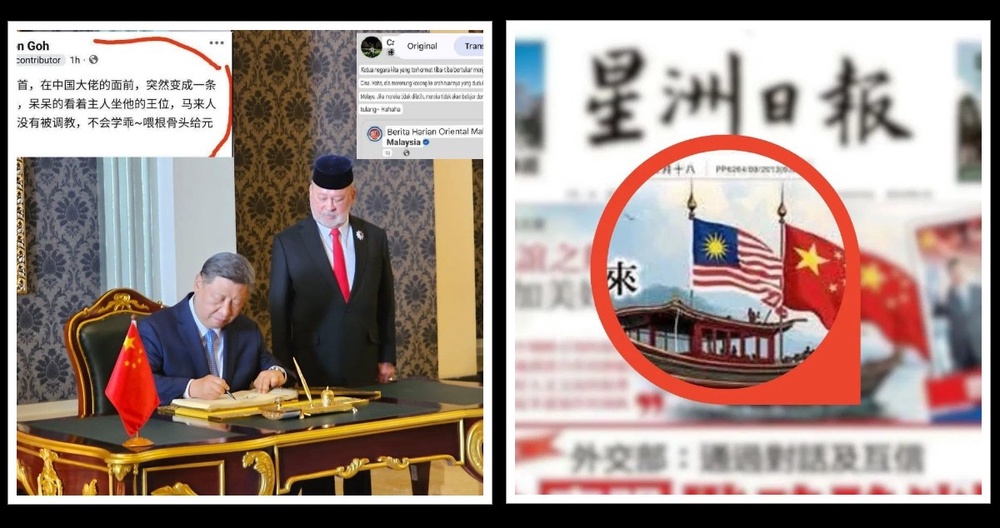
The power dynamics between the local Malays and Chinese might affect the relationship between China and Malaysia
24 Apr 2025 • 8:00 AM MYT

TheRealNehruism
Writer. Seeker. Teacher

ImImage credit: Marketing Interactive / Focus Malaysia
Malaysia was amongst the very first nations that President Xi Jinping of China visited when his country looks like it is going to be embroiled with a bitter trade war with America, that will likely pit the top two nations in the world against each other.
That we are amongst the first countries that he visited brims with meaning.
Before you enter a conflict with a powerful opponent, the first people you will meet are your closest allies – your closest allies are the ones, outside of your immediate family or nation, whose relationship with you is without a doubt.
The three countries that President Xi visited, all were in Southeast Asia. Of the three, Malaysia is the only one that is not influenced by communism. Vietnam, the other country that President Xi visited, is still a communist country. Cambodia, the third country that President Xi visited, although no longer fully communist, has a long history with communist, with its ruling party, the long serving Cambodian People's Party (CPP), highly influenced by the communist ideology.
From this fact alone we can see that if China’s and America’s dispute escalates, China will likely call upon SEA nations as the first region to take its side.
Some SEA nations like Vietnam, Cambodia or Laos, are likely SEA nations that it will expect to take its side, on account of ideological bonds, but Malaysia is nation that it will expect to take its side, simply because China might see its relationship with Malaysia as "special", on account of the long and cherished relationship that the dragon has had with the mousedeer, that transcends ideological kinship and the ebb and flow of international geopolitics.
Time will tell whether the fact that we have such a “special” relationship with China is going to be a blessing or a curse, but one thing is for certain, the problematic relationship that the local Malays and Chinese are having in our local power dynamics, is something that might add a lot of uncertainty and problems, in terms of our relationship with China.
If the missing crescent moon uproar and other incidents that occurred during President Xi's visit are taken at hint, we can see that the Malays in Malaysia, might be feeling jittery on account of the “special” relationship that the government of Malaysia and China are forging, likely because the local Chinese are seemingly too excited over the “special” relationship that Malaysia seems to be developing with China.
While no one has spoken ill in regards to President Xi’s much celebrated visit to Malaysia last week, not only on account of the fact that China is a superpower, but also because the dragon is indeed an old an cherished friend of the mousedeer, the fact that that the uproar in regards to the missing crescent moon erupted between the local Malays and local Chinese, even when President Xi was still in our shores, is an indication that political tension between the local Chinese and the local Malays will likely have an impact between the relationship between China and America.
Ideologically, Malaysia is closer to the west than China.
Historically, Malaysia might have been colonised by the west, while China had enabled and empowered the Sultanate of Malacca, which in turn had served as the foundation of modern Malaysia, but considering that Malaysia’s relationship with the West is more recent, and considering that most Malaysians do not have negative view of relationship with the West, even though the West had acted in an imposing and exploitative manner towards us during the colonial era, America and the west still has a lot of influence and leverage in Malaysia.
Malaysians today might rue the disrespectful and dismissive manner that America is treating us - either in lieu of the tariffs that Trump has imposed on us or on account of insolent remark that such American commentator Bill O'Reilly has made against us recently - which might incline us to see the benefits of aligning closer to China, considering the importance, respect and honour that China accords its relationship with us, despite the fact that we are a much smaller nation - but if the local Malays continue to perceive that a closer relationship with China, will increase the leverage of the local Chinese, and upend the power dynamics within the country, you cannot discount the possibility that Malaysia might find itself torn between choosing China and America.
For pragmatic and rational reasons, I think that Malaysia’s best interest lies in betting in favour of China more than we do for the West.
I also believe that as a civilisation, China has a long memory and culture that places a tremendous value on honour and loyalty, and thus it will likely not easily forgive or forget, a case of a nation flip flopping and not honouring its promises and commitments towards it.
If Malaysia favour China, we should signal that we favour China and if we don’t, we should signal that we wish to be neutral – but once we send our signal, it is best that we honour it, because it is unlikely that China will not appreciate a mix message, or easily forgive and forget a U-turn, even if 100 years passes.
Personally, I think that Malaysia’s best interest lies in choosing the winner, in the upcoming conflict between China and America.
We tend to assume that the reason that our country, as well as countries like Singapore, Taiwan, South Korea and Japan has done so well for many decades is because our people are smart, talented and hardworking, but a key factor of our success is that we chose the winning side.
The people of Laos and Cambodia are also hardworking, and they do not lack intelligence or talent either. If they are not as developed as Singapore or Malaysia, it is chiefly because they chose the losing side in the past
If we had chosen the losing side in the past, our fate and fortune would likely have been no different to that of Laos or Cambodia, no matter how talented, smart and hardworking we assume we are.
To choose the winner, I think what we should do is consider the circumstances and our options in a logical, objective and rational manner.
However, I feel that the local power dynamics between the local Malays and the local Chinese, added together with an irrational connections that the local Chinese feel towards China on the basis of identity, might cause us to view our situations and options in an emotional, ego driven, identity focused and irrational manner, which then might lead us towards a decision that we might regret.
No comments:
Post a Comment